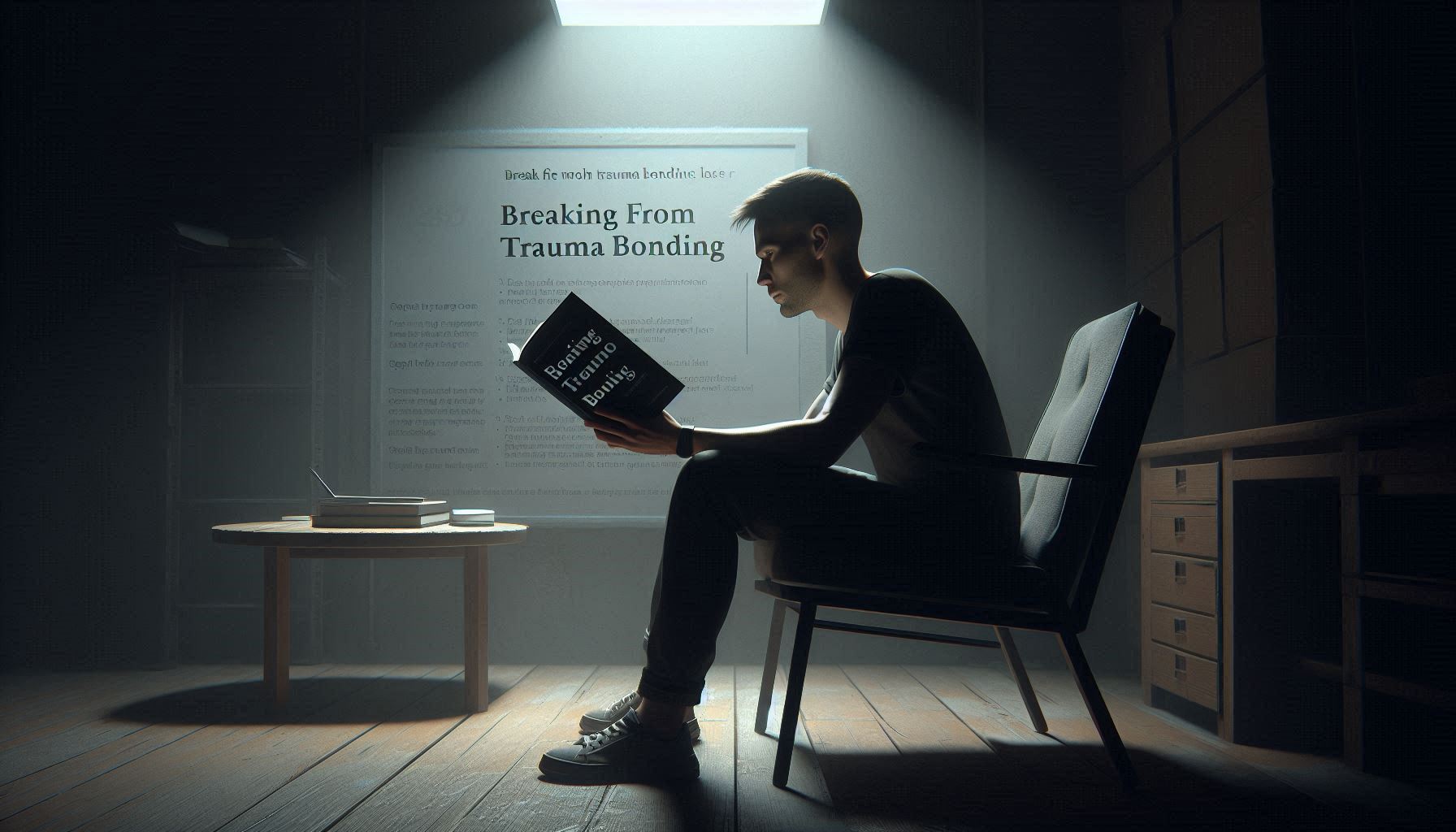Understanding Trauma Bonding in Relationships: Breaking Free for Healthier Connections
The Hidden Chains of Trauma Bonding
Relationships are meant to offer comfort, support, and love. However, in some relationships, the dynamics are anything but healthy.
Instead of growing in trust and intimacy, some people find themselves stuck in toxic patterns where they feel trapped and powerless to leave. Often, this is a result of trauma bonding—a deeply rooted emotional attachment that forms between a person and their abuser, typically in an abusive or manipulative relationship.
It can be hard to recognise, especially when it’s masked by moments of kindness or affection, which only further complicate the emotional pull.
In this article, we will explore what trauma bonding is, how it manifests in relationships, and why becoming more self-aware of trauma bonds is critical for healthier, more fulfilling relationships.
You will also learn the signs of trauma bonding, take the Trauma Bonding Test, and find actionable steps you can take to break free from these damaging cycles.

What is Trauma Bonding?
Trauma bonding occurs when an individual forms an unhealthy attachment to someone who is consistently abusive or manipulative. The bond is built on intermittent reinforcement—periods of positive behaviour, affection, or reconciliation followed by periods of abuse or neglect.
This cycle creates a powerful emotional dependency, as the victim begins to feel that any love or affection in the relationship is contingent upon enduring the abuse.
In trauma-bonded relationships, the brain’s reward system becomes wired to seek out the highs (affection, apologies, or moments of reconciliation) after enduring the lows (manipulation, neglect, or abuse).
Over time, this makes it extremely difficult for the person experiencing the abuse to leave, as they become conditioned to believe the “good moments” are worth the pain they endure.

The Benefits of Self-Awareness in Trauma Bonded Relationships
Recognising trauma bonds is the first and most crucial step towards healing. Many individuals caught in these cycles believe they are somehow at fault for the issues in the relationship or that things will improve if they “just try harder.”
In reality, understanding the nature of trauma bonding can provide clarity, allowing individuals to see that they are not to blame for the abuse and manipulation.
Becoming more self-aware of trauma bonding in your relationship can lead to several important realisations:
- Empowerment: Understanding trauma bonding helps break the illusion that the relationship will improve with time. You can begin to see patterns and realise that true love and partnership don’t require enduring pain.
- Healthier Boundaries: Once you recognise how trauma bonds are affecting your relationship, you are better equipped to set and enforce healthier boundaries with your partner.
- Emotional Freedom: Awareness is the key to freeing yourself from the guilt and confusion often experienced in trauma-bonded relationships. When you see the bond for what it is, you can take steps towards emotional independence and healing.
- For professionals: Encouraging clients to explore their own relationship dynamics and fostering self-awareness can be a powerful tool in helping them to break the cycle of trauma bonding.

“Freeing yourself was one thing, claiming ownership of that freed self was another.” – Toni Morrison – Beloved
Signs of Trauma Bonding
Recognising a trauma bond can be difficult because it often disguises itself as intense passion or deep emotional connection. However, there are several signs that trauma bonding may be at play in your relationship:
- You feel trapped but cannot leave. Despite the relationship being toxic or harmful, you find yourself unable to walk away. The idea of leaving fills you with fear or guilt.
- The relationship follows a cycle of abuse and reconciliation. After every argument or instance of abuse, the abuser showers you with affection or makes promises of change, leading to a brief period of calm before the cycle repeats.
- You defend their behaviour. You may find yourself justifying or excusing your partner’s harmful actions to yourself and others, believing that they don’t “mean to hurt you.”
- You believe the good moments outweigh the bad. Even though the bad moments may be deeply hurtful, you convince yourself that the good times justify staying in the relationship.
- You blame yourself for the problems in the relationship. The abuser may manipulate you into believing that their actions are your fault, causing you to take on excessive guilt and responsibility.
- Your self-worth is tied to the relationship. You may start to believe that you are unlovable or not worthy of better treatment, leading to a deeper emotional dependency on the abuser.

Are You in a Trauma Bonded Relationship? Take the Test
This test is designed to help you reflect on the dynamics of your relationship and assess whether trauma bonding might be playing a role. Select the answer that best describes your situation.
1. How do you feel when you think about leaving your partner?
a) Relieved, but unsure if it’s the right decision
b) Terrified, even though the relationship is painful
c) Confident, I know it’s the best choice for me
d) Indifferent, I don’t feel strongly either way
2. Does your relationship follow a cycle of arguments or hurtful behaviour followed by intense affection or apologies?
a) Yes, this cycle happens frequently
b) No, we rarely argue or have issues
c) Occasionally, but it doesn’t feel like a pattern
d) I’ve never noticed any cycle like that
3. How often do you blame yourself for problems in the relationship?
a) All the time, I feel like everything is my fault
b) Sometimes, but I know my partner has issues too
c) Rarely, we’re both responsible for our actions
d) Never, I’m confident in addressing what’s wrong
4. Do you find yourself justifying your partner’s hurtful behaviour to friends or family?
a) Yes, I often make excuses for them
b) Sometimes, but I know deep down it’s not right
c) No, I don’t need to defend them
d) I’ve never had to explain their behaviour to anyone
5. Do you feel emotionally or physically drained after spending time with your partner?
a) Yes, most of the time
b) Occasionally, but I think it’s normal
c) No, I feel supported and energised
d) Rarely, but we all have rough days
6. Does your partner isolate you from friends or family, or get upset when you spend time with others?
a) Yes, they don’t like me being close to others
b) Sometimes, but they usually get over it
c) No, they encourage me to maintain relationships
d) They never seem to mind who I spend time with
7. When your partner hurts you emotionally or physically, do they make grand gestures to win you back afterwards?
a) Yes, they often apologise with gifts or big promises
b) Sometimes, but I don’t always believe them
c) Rarely, they usually don’t make a big deal about it
d) No, we handle conflicts calmly and respectfully
8. Do you feel like you’re “walking on eggshells” to avoid upsetting your partner?
a) Yes, all the time
b) Occasionally, but I can still be myself
c) No, I feel comfortable being who I am
d) Rarely, I don’t think about it much
9. Do you believe that things will improve if you just try harder in the relationship?
a) Yes, I’m always trying to make things better
b) Sometimes, but I’m losing hope
c) No, I know it’s not all my responsibility
d) I don’t think I should have to work that hard for love
10. How would you describe your self-esteem since being in this relationship?
a) Much lower, I don’t feel like myself anymore
b) It’s declined a bit, but I still have some confidence
c) It’s about the same as before
d) It’s improved, my partner lifts me up
Answer Key and Interpretation
- Mostly a’s: It’s likely that you are in a trauma bonded relationship. You feel trapped, responsible for your partner’s behaviour, and exhausted by the emotional cycle of highs and lows. It may be helpful to seek support from a professional or trusted loved one to help you assess the relationship more clearly and take steps towards healing.
- Mostly b’s: There are signs of trauma bonding in your relationship, but you may still be holding on to hope that things will improve. It’s important to reflect on whether the relationship is meeting your emotional needs or if the cycle of hurt is causing more harm than good.
- Mostly c’s: You don’t appear to be in a trauma bonded relationship. Your answers suggest a balanced perspective on conflict, responsibility, and emotional well-being in your relationship. Continue to maintain healthy boundaries and communication.
- Mostly d’s: Your relationship seems to be on solid ground. You feel confident in your partner’s behaviour and your self-worth is intact. Keep nurturing the positive dynamics and stay mindful of any potential red flags in the future.

Taking Action: How to Break Free from Trauma Bonding
If you’ve identified trauma bonding in your relationship, it’s important to know that breaking free is possible, though it may be difficult. Here are some actionable steps to help you begin the process of healing:
- Acknowledge the Trauma Bond: The first step is recognising and accepting that trauma bonding is occurring in your relationship. This self-awareness can be difficult but is vital for change.
- Seek Support: Whether through friends, family, or a professional therapist, talking about your experiences with someone outside the relationship can offer much-needed perspective and validation.
- Set Boundaries: Begin by establishing clear emotional and physical boundaries with your partner. This could mean limiting contact or deciding to take a break from the relationship to evaluate its impact on your well-being.
- Focus on Self-Care: Trauma bonding often leaves individuals emotionally depleted. Prioritise self-care practices like journaling, meditation, or engaging in activities that bring you joy and a sense of control.
- Consider Professional Help: Trauma bonding is a complex psychological issue that can be challenging to navigate alone. A therapist, especially one trained in trauma recovery, can help you break the cycle of abuse and build healthier relationships moving forward.
Recommended Materials for Further Reading
If you’d like to learn more about trauma bonding and how to break free, these two books provide valuable insights and practical advice:
1. “The Betrayal Bond: Breaking Free of Exploitive Relationships” by Patrick J. Carnes
This book delves deeply into trauma bonding and offers actionable strategies for recognising and overcoming unhealthy relationships.
2. “Trauma Bonding: A Guide to Breaking Free and Healing From an Abusive Relationship” by Harper Emerson.
In this book, you’ll delve deep into the psychology of trauma bonding. Learn how these powerful emotional connections are formed, why they persist, and the profound impact they have on your mental and emotional well-being.
To learn how to overcome trauma with actionable steps and methods see our Overcome Trauma and PTSD online course at this link.
Conclusion: Healing and Reclaiming Your Life
Breaking free from trauma bonding is not easy, but it is possible. By becoming more self-aware of how these unhealthy dynamics play out in your relationships, you can begin to take back control of your emotional well-being.
Remember, real love is not painful or manipulative—it’s supportive, freeing, and kind. You deserve to experience relationships that uplift you rather than weigh you down.
Dr Tom Barber is a #1 bestselling author, integrative and existential psychotherapist and coach, supervisor, researcher, speaker, and co-founder of Self Help School. His work has spanned nearing 30 years, in which he has focussed on helping people all over the world to improve their knowledge and understanding of their psychological worlds. Tom regularly delivers courses and lectures in the UK, USA, Canada, Mexico, and across Europe. In addition, he maintains a private therapy and coaching consultancy from his base in Essex, and online.

